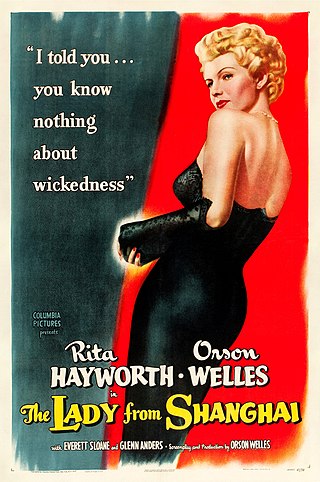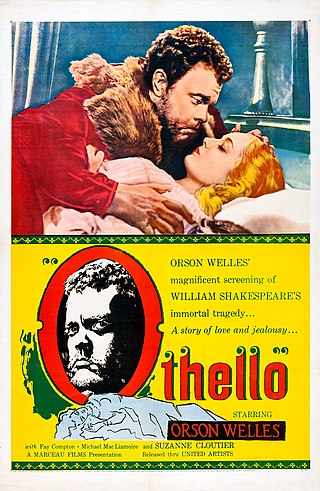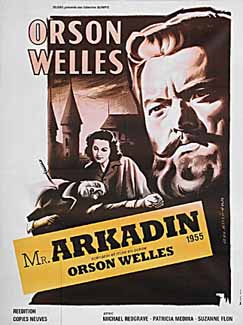
George Orson Welles was an American director, actor, writer, producer, and magician who is remembered for his innovative work in film, radio, and theatre. He is considered to be among the greatest and most influential filmmakers of all time.

The Third Man is a 1949 film noir directed by Carol Reed, written by Graham Greene, and starring Joseph Cotten, Alida Valli, Orson Welles and Trevor Howard, set in post-war Vienna. The film centres on an American, Holly Martins (Cotten), who arrives in the city to accept a job with his friend Harry Lime (Welles), only to learn that Lime has died. Martins decides to stay in Vienna and investigate his death.
The Adventures of Harry Lime is an old-time radio programme produced in the United Kingdom during the 1951 to 1952 season. Orson Welles reprises his role of Harry Lime from the celebrated 1949 film The Third Man. The radio series is a prequel to the film, and depicts the many misadventures of con-artist Lime in a somewhat lighter tone than that of the film.

Kenneth Peacock Tynan was an English theatre critic and writer. Initially making his mark as a critic at The Observer, he praised John Osborne's Look Back in Anger (1956) and encouraged the emerging wave of British theatrical talent.

The Mercury Theatre was an independent repertory theatre company founded in New York City in 1937 by Orson Welles and producer John Houseman. The company produced theatrical presentations, radio programs and motion pictures. The Mercury also released promptbooks and phonographic recordings of four Shakespeare works for use in schools.

F for Fake is a 1973 docudrama film co-written, directed by, and starring Orson Welles who worked on the film alongside François Reichenbach, Oja Kodar, and Gary Graver. Initially released in 1974, it focuses on Elmyr de Hory's recounting of his career as a professional art forger; de Hory's story serves as the backdrop for a meandering investigation of the natures of authorship and authenticity, as well as the basis of the value of art. Far from serving as a traditional documentary on de Hory, the film also incorporates Welles's companion Oja Kodar, hoax biographer Clifford Irving and Orson Welles as himself. F for Fake is sometimes considered an example of a film essay.

The Lady from Shanghai is a 1947 American film noir produced and directed by Orson Welles that stars Rita Hayworth, Welles and Everett Sloane. Welles's screenplay is based on the novel If I Die Before I Wake by Sherwood King.

Othello is a 1951 tragedy directed and produced by Orson Welles, who also adapted the Shakespearean play and played the title role. Recipient of the Grand Prix du Festival International du Film at the 1952 Cannes Film Festival, the film was distributed by United Artists when it was released in the United States in 1955. Othello was filmed on location over a three-year period in Morocco, Venice, Tuscany and Rome as well as at the Scalera Studios in Rome.

Mr. Arkadin, known in Britain as Confidential Report, is a French-Spanish-Swiss co-production film noir, written and directed by Orson Welles and shot in several Spanish locations, including Costa Brava, Segovia, Valladolid, and Madrid. Filming took place throughout Europe in 1954, and scenes shot outside Spain include locations in London, Munich, Paris, the French Riviera, and at the Château de Chillon in Switzerland.

Elaine Rita Dundy was an American novelist, biographer, journalist, actress and playwright.

It's All True is an unfinished Orson Welles feature film comprising three stories about Latin America. "My Friend Bonito" was supervised by Welles and directed by Norman Foster in Mexico in 1941. "Carnaval" and "Jangadeiros" were directed by Welles in Brazil in 1942. It was to have been Welles's third film for RKO Radio Pictures, after Citizen Kane (1941) and The Magnificent Ambersons (1942). The project was a co-production of RKO and the Office of the Coordinator of Inter-American Affairs that was later terminated by RKO.
Moby Dick is a two-act drama by Orson Welles. The play was staged June 16–July 9, 1955, at the Duke of York's Theatre in London, in a production directed by Welles. The original cast included Welles, Christopher Lee, Kenneth Williams, Joan Plowright, Patrick McGoohan, Gordon Jackson, Peter Sallis, and Wensley Pithey. The play was published by Samuel French in 1965.

The Other Side of the Wind is a 2018 satirical drama film co-written, co-edited, and directed by Orson Welles, and posthumously released in 2018 after 48 years in development. The film stars John Huston, Bob Random, Peter Bogdanovich, Susan Strasberg, and Oja Kodar.

Orson Welles (1915–1985) was an American director, actor, writer, and producer who is best remembered for his innovative work in radio, theatre and film. He is widely considered one of the greatest and most influential filmmakers of all time.
Don Quixote is an unfinished film project written, co-produced and directed by Orson Welles. Principal photography took place between 1957 and 1969. Test footage was filmed as early as 1955, second-unit photography was done as late as 1972, and Welles was working on the film intermittently until his death in 1985. The film was eventually edited by Jesús Franco and was released in 1992, to mixed reviews.

Lost television broadcasts are mostly those early television programs which cannot be accounted for in studio archives.

The Merchant of Venice is a 1969 drama short film directed by Orson Welles based on William Shakespeare's play of the same name. While actually completed, it is frequently cited as an unfinished film, though better described as a partially lost film due to the loss of film elements.
Vienna is a 1968 short film directed by Orson Welles. It was originally produced as part of his abandoned television special, Orson's Bag, which was made for CBS. However, in 1969, with the project close to completion, CBS withdrew their funding over Welles' long-running disputes with US authorities regarding his tax status. The film remained uncompleted. Despite its name, Vienna freely mixes footage shot in Vienna, Zagreb, and a Los Angeles studio. An 8-minute segment was restored by the Munich Film Museum in 1999.
Moby Dick is an unfinished film by Orson Welles, filmed in 1971. It is not to be confused with the incomplete 1955 film Welles made of his meta-play Moby Dick—Rehearsed, or with the 1956 film Moby Dick, in which Welles played a supporting role.

It's All True: Based on an Unfinished Film by Orson Welles is a 1993 documentary film about Orson Welles's ill-fated Pan-American anthology film It's All True, shot in 1941–42 but never completed. Written and directed by Richard Wilson, Bill Krohn and Myron Meisel, the film is narrated by Miguel Ferrer. It was named the year's Best Non-Fiction Film by the Los Angeles Film Critics Association, and its filmmakers received a special citation from the National Society of Film Critics.















